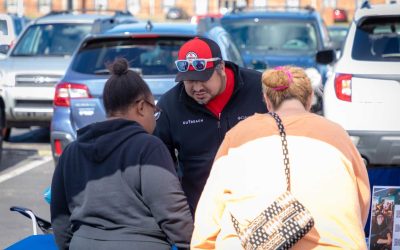Frank Pulice dropped his left shoulder and delivered a well-timed combination to the heavy bag swinging in front of him at a North Shadeland boxing gym. He recently put on boxing gloves for the first time in decades, but his opponent now isn’t another teenager. It’s the progressive disease he has in common with Muhammad Ali and Michael J. Fox.
Frank has Parkinson’s disease, and like thousands of other patients, he’s found help at Rock Steady Boxing, the national exercise club with a North Shadeland gym that helps many Parkinson’s patients with movement—and hope—through a non-contact, boxing-based fitness program.
“I wasn’t sure if I wanted to do this, but my daughter-in-law convinced me,” he said during a break. “Before I came here, I felt a little more tired, a little weak. I seem to be getting some of my strength back, which is good.”
Frank retired from the financial services industry in New York and was diagnosed a few years ago. His daughter-in-law, Andrea Pulice, not only persuaded him to join Rock Steady, but is his partner—his “corner person” —in the gym.
“I’m someone who is here to support him and work out with him, and help him stay motivated to come,” she says. The benefits, which include better mobility and balance, aren’t just physical.
“There’s hope,” Andrea says. “There’s definitely hope, and you can work together to fight against it.”

Agility and strength
Parkinson’s, a degenerative condition that causes loss of motor skills, balance, and speech functions, afflicts more than a million people in the United States. The Rock Steady program has adapted drills from the ring to condition its boxers for greater agility, muscular endurance, and overall strength.
“Exercises vary in purpose and form but share one common trait: They are rigorous and intended to extend the perceived capabilities of the participant,” the group says.
“At RSB, Parkinson’s disease is the opponent.”
Jessica Eckelbarger is the head coach at Rock Steady Boxing in an office park across from Lake Castleton Apartments. She says the training is non-contact but challenging. The boxers do crunches to develop their core strength so they can get back up when they fall.
“It really helps your body. It helps your symptoms,” she said of the training.
“But it also helps your emotional self, your soul—just so you have somewhere to go that you don’t feel excluded.”
Getting their lives back at Rock Steady Boxing
Exercise has been shown to slow down the progression of Parkinson’s disease.
“The people here tell me that they’re so happy they found this place,” Jessica said. “Now they can still do those trips that they wanted to do when they retired. It’s giving them their life back.”
The training partners on this day include Annette Pychinka, here with her husband Bob, who has Parkinson’s and has been with Rock Steady since 2016.
“It gives you a sense of camaraderie,” she says. “You don’t have the ‘pity party,’ because you see other people just like you.”
Jessica has felt the support and encouragement first-hand. She was diagnosed with the condition herself four years ago, came as a boxer, then as a volunteer and now directs the trainers and volunteers.
“I have younger children, so it’s given me the hope that I’ll be able to see their graduations, their weddings, play with my grandchildren,” she says.
“Rock Steady has given me hope for the future.”
Editor’s Note: The non-profit Rock Steady is always looking for more volunteers and support. For more information about the program or to see about joining, go to https://rocksteadyboxing.org/, visit the gym at 6847 Hillsdale Court or contact the group at hqgym@rocksteadyboxing.org or (317) 288-7035.





